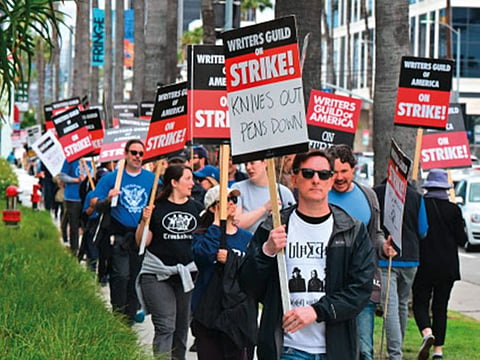Half of Americans approve of Hollywood actors' and writers' strike, according to a poll
56% say it would be a good thing for screenwriters to be paid more; 38% support actors

A majority (55 per cent) of US adults sympathise with the writers and actors in the months-long dispute than with the studios they’re striking against (3 per cent), the poll from The Associated Press-NORC Center for Public Affairs Research shows.
Half of Americans (50 per cent) approve of writers and actors striking, while 40 per cent are neutral on the topic, and 9 per cent disapprove.
The more people said they had heard about the strike, the more likely they were to favour it. About six in 10 Americans have heard “a lot” or “some” about the labour strikes of writers and actors against Hollywood studios. People who have heard “a lot” or “some” about the strike are more likely than those who have heard less to approve (63 per cent vs. 29 per cent).
“I’m a big supporter of labour,” said one respondent, James Denton of Louisville, Kentucky, who said he strongly approves of the strikes and has followed them closely. “I’m a union member myself, my father was the president of a union, I believe in unions, they’re well worth the money.”
About a quarter (24 per cent) of US adults do not sympathise with either the writers and actors or the studios, and 18 per cent are split between the sides.
Overall sympathy toward the writers and actors runs much more strongly among Democrats (70 per cent), than Independents (47 per cent) and Republicans (39 per cent). Republicans (35 per cent) are more likely than Democrats (15 per cent) to say they sympathise with neither side.
When the questions move beyond approval toward potential actions favoring the strike, the support gets considerably softer.
One-third would consider boycotting TV shows, while even more (41 per cent) would not. Slightly fewer (27 per cent) said they would consider cancelling streaming services, while 44 per cent said they would not. Three in 10 Americans also said they would consider boycotting movie theatres, while 34 per cent would not. The unions have yet to ask for any of these moves from consumers, though have said they might if the standoffs last long enough.
Denton, 77, said he would not consider such moves, but added that it wouldn’t matter much.
“I don’t watch anything anyway,” he said. “I don’t go to movies anymore.”
The poll was conducted September 7-11, as the Hollywood protests over pay and work protections stretched into their fifth month for writers and third month for actors. The Writers Guild of America has restarted negotiations with the alliance of studios and streaming services they’re striking against. The Screen Actors Guild-American Federation of Radio and Television Artists are waiting in the wings.
While actors are usually the ones getting public adulation, many more think writers deserve a pay bump than they do actors.
A majority of Americans (56 per cent) say it would be a good thing for screenwriters to be paid more, but only 38 per cent say the same about actors’ compensation. Americans under 45 are more likely than older adults to call higher wages for actors a good thing (44per cent vs. 32per cent), but they are similarly likely to see higher pay for screenwriters favourably.
Overall, about half of US adults (48 per cent) say it would be a good thing if studios were prevented from replacing writers with AI. Alternatively, only 10 per cent say it would be good for studios to use AI to help write movies and TV shows. Half (52 per cent) say it would be a bad thing for studios to use AI in this way.
Sign up for the Daily Briefing
Get the latest news and updates straight to your inbox








